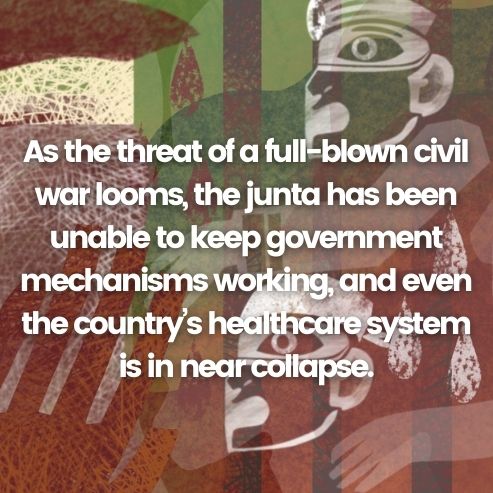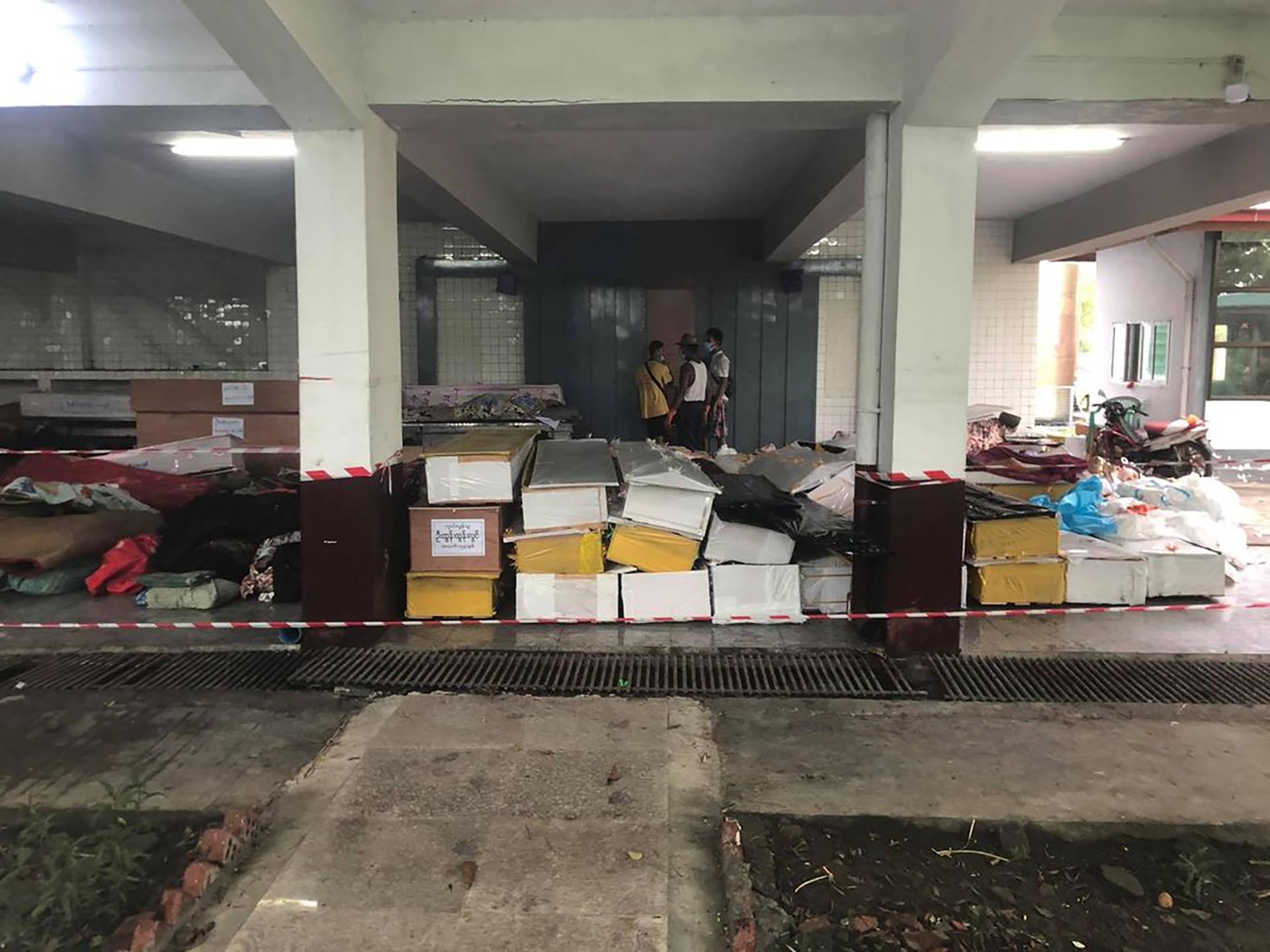Myanmar’s military junta is emerging as the single biggest obstacle in the country’s fight against COVID-19 even as its head calls for international cooperation to contain the deadly virus.
With most of the country’s people continuing to resist its rule, the junta has been arresting even doctors, nurses, and community health workers, controlling oxygen supply, and imposing nightly curfews. It has taken over hospitals, where its soldiers send people home without receiving any treatment. In addition, the country’s vaccination program has also come to a standstill.

The Southeast Asian nation is currently battling a third wave of coronavirus infections, with the daily average of confirmed cases now hitting some 4,000 a day. In the latest surge alone, in June and July 2021, the number of COVID-19 fatalities — nearly 9,000 — had already surpassed the combined total of deaths from the previous two waves. A volunteer health worker in Sagaing region, in the country’s northwest, says, “I’m not exaggerating, every ward in the town has funerals, at least one each every day.”
As of 8 August, Myanmar has more than 330,000 confirmed cases of COVID-19, with a total of over 12,000 deaths since 3 January 2020, according to the World Health Organization.
This week, junta leader Senior General Min Aung Hlaing called for “cooperation” among nations to prevent the further spread of the virus. For the people of Myanmar, however, the solution is clear. Says a volunteer health worker in Yangon: “The situation will be handled well only if power is transferred back to the civilian government.”
During the country’s first two COVID-19 waves, the people had cooperated with the government led by Daw Aung San Suu Kyi and helped in containing the spread of the virus. But Myanmar was thrown into utter chaos last February when the military suddenly seized power, deposed parliament, and detained the country’s duly elected leaders. Despite the military’s use of brute force, which has claimed the lives of hundreds of people so far, the country’s citizens are refusing to be brought to heel and have been fighting back. As the threat of a full-blown civil war looms, the junta has been unable to keep government mechanisms working, and even the country’s healthcare system is in near collapse.
“Almost all the hospitals have run out of space and they cannot accept COVID-19 patients anymore,” says the Yangon volunteer health worker. “Even in the COVID-19 specialized centers, the access to oxygen is limited. Many people are dying in their houses as they do not have any access to oxygen.”
“Unlike the first and second waves, the doctors, nurses and volunteers are not sufficient to deal with the situation,” the volunteer health worker adds. “Many healthcare workers including me are infected with virus.”
Medical workers under siege
One of the main reasons why Myanmar is now short of doctors and other healthcare workers is because they have become prime targets in the junta’s crackdown on those opposed to its rule. Healthcare professionals and volunteers had been among those who had spearheaded the Civil Disobedience Movement (CDM) that continues to grow every day. According to the Assistance Association for Political Prisoners, more than 595 medical staff, including 414 doctors, 180 nurses and one other medical personnel have been issued warrants of arrest.
The rise in COVID-19 cases in the country has not stopped the military from going after healthcare personnel. On 13 July, for instance, Kyat Kyaw Thet, a COVID-19 volunteer telemedicine doctor, was arrested in Mandalay and tortured in prison. Three days later, the military arrested Dr. Thet Htay for civil disobedience. Five other volunteer doctors were arrested at a charity clinic in Yangon on 19 July. Comments a volunteer doctor: “We doctors are not safe on the ground. The military junta is intentionally targeting and oppressing us. So, we can only provide telehealth services. But even in teleconsultation, we sometimes receive the threat calls from the junta forces.”
Community volunteers involved in COVID-19 prevention and support have not been spared. In Kawkeriet township, tens of COVID-19 volunteers were arrested on 23 July.
The arrests are taking place without apparent thought on the consequences on Myanmar’s healthcare system, let alone its fight against COVID-19. A data volunteer worker at a Yangon quarantine center says, “I used to do volunteering in the past COVID-19 first and second waves. This time around, only less than one-third of the previous volunteers and a very few medical professionals are back and working.”

In June, just as the third wave was starting, Dr. Htar Htar Lin, former Director and Program Manager of Myanmar’s Expanded Program on Immunization (EPI) and leader of the country’s vaccination program was herself arrested. She has been detained and charged with corruption, high treason, colluding with an illegal organization, and incitement against the junta.
Just last 8 August, Dr. Maung Maung Nyein Tun of the Mandalay Medical University died of COVID-19 while in detention. Tun was arrested on 13 June for taking part in the CDM and for his close association with Dr. Lin. While in detention at the Mandalay Palace interrogation center, it was reported that Tun tested positive for COVID-19 on 13 July, but was not allowed to seek medical treatment until two weeks later, by which time his blood oxygen levels had fallen to dangerous levels. The prison hospital was not equipped with the proper tools which could have ensured his survival. He was brought to the Mandalay General Hospital but it was too late.
Myanmar had barely begun its vaccination program when the military staged a coup on 1 February. Now it is barely moving. The WHO says that Myanmar has administered 3.3 million vaccines as of 4 June, which translates to about two percent of the country’s 54 million population having received the full two shots.
The junta has been talking about vaccination plans, with the vaccines coming possibly from Russia and China. But the thought of receiving a jab courtesy of the junta is turning off many people from getting vaccinated. The Yangon data volunteer worker says, “Unavoidably, I have to work with junta ministry in order to save people from COVID-19. But I won’t take vaccination from the junta.”
A Yangon university student also says, “Now people hate the junta too much and we do not want and trust on any assistance given from them or their allies, China or Russia. My simple suggestion is to bring third-party, non-junta assistance and vaccination to the people of Myanmar.”
Opening schools or opening virus gateways?
Some observers say the junta is actually to blame for the current COVID-19 surge. In March and June, the junta had forcibly opened the schools and universities, despite the devastating COVID-19 situation then unfolding in neighboring India. These institutions turned out among the main sources of infections that led to the present wave. For instance, on 29 June, Mawlamyine University Students’ Union released a warning in which it said that of the more than 400 students attending classes there, nearly a quarter had been detected as having COVID-19. The junta announced the temporary closure of all schools from 9 July, but by then it was too late.
The pandemic has also revealed the junta’s apparent inability to prepare and respond to emergencies. Aside from arresting and detaining medical personnel — the very people needed in the current crisis — the junta has also taken to cornering the supply of medical-grade oxygen in the country for military hospitals. Previously, the people had no problem of obtaining oxygen from private and public plants. But the lack of foresight on the part of the junta and the sudden surge in COVID-19 cases led to the present shortage in oxygen supply.
These days, one even needs to secure a verification letter from one’s ward office council — which is under the junta — just to have a chance of getting oxygen. A community volunteer in Chin State in the country’s west also says, “The travel restriction and night curfew makes the transport of oxygen supply delayed and it slows down the sufficient access of oxygen supply in the town.”

Too many dying too fast. There were more dead than they could handle at the Htain Pin Cemetery in Yangon last July. (Photo by THN Freelance Journalist)
In truth, the night curfew imposed by the junta has complicated the whole situation all the more, with people having more difficulties accessing medical care and oxygen supply because of it. A volunteer at a COVID-19 center in Yangon says, “Many people have unnecessarily died at night. If they had accessed the oxygen or access to hospital, I believe many of them would still be alive.”
“These junta forces just shoot whatever they see on the streets at night,” another healthcare worker from Sagaing region says. “In June, a youth like us had to go to get oxygen as his whole family was sick. When he saw the soldiers on the street, he tried to show the oxygen tank to avoid being suspected of something else. Unfortunately, these soldiers just shot at him and he hurt his leg. I think more than 60 patients from my small town died because they could not get oxygen and treatment due to the curfew.”
Yet another healthcare volunteer, this time from Taunggyi in Shan State, says, “Many patients are dying during the curfew hours. Around five a.m., when the curfew ends, we usually receive the calls to carry the dead bodies.”
Across Myanmar, however, people are trying to come together to make it through the current COVID-19 wave. Local folk are building oxygen plants in many towns across the country, without help from the junta. An oxygen plant committee member in Southern Shan State says, “Due to the shortage of oxygen and high fatality rate in my town, the elders, businessmen, and community volunteers discussed and decided to build the township oxygen plan, without any guidance of junta.”
Young people have also organized themselves, with some forming volunteer groups to help out those who are sick, and others creating online communities through which they can identify places that have oxygen supplies. Explains one 24-year-old community volunteer in Yangon: “With what is happening in Myanmar, I cannot just stand and watch. So I decided to start the initiative to buy food, medicine, and other goods, and to wait in queue for oxygen, on behalf of the sick families from my town, Sanchaung.” ●
Jesua Lynn is an independent researcher and peace-education trainer. He has authored and co-authored more than four publications in Myanmar in the fields of human rights, anti-hate speech, youth activism, and peace-building.



















